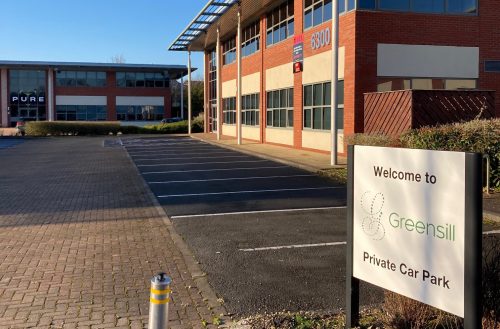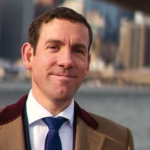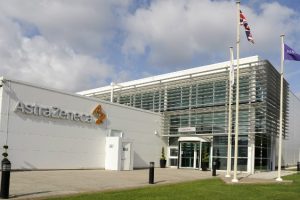Remember Greensill Capital? A quick refresher on the winners and losers

In June 2020, CBRE’s Office Agency team in Liverpool were cock-a-hoop at securing the largest out-of-town letting in their wide definition of the Liverpool City Region to put Greensill Capital into new offices at Daresbury 2100, Daresbury Park near Warrington.
It was meant to be part of the global fintech firm’s expansion plans into the North West, creating more than 200 jobs for the region in a 27,212 sq ft of office space with a high-quality refurbishment.
A separate deal at Orbit’s neighbouring 1100 Daresbury Park extended their presence on the 225-acre business park off junction 11 of the M56 in Warrington.
Now both the offices are available and look an attractive proposition. On the website of Orbit Developments the site is described as “a superior business park .. home to a number of highly regarded businesses including ABB, HCRG Care Group, Ministry of Justice, Redrow homes and Stannah.”
The last time TheBusinessDesk.com was in the area the car park and offices lay empty and abandoned behind a rusting chain and a sad looking Greensill sign.
No mention is made in the brochure of the previous tenant – why would you? – but in years to come it may be deserving of a special plaque. A place where history was made, in one of the most spectacular corporate collapses of recent times.
Much of the story has been told in a book, The Pyramid of Lies: Lex Greensill and the Billion-Dollar Scandal by journalist Duncan Mavin, but arguably the final chapter has yet to be written.
Back in the news

David Cameron
But Greensill is back in the news this week as its former advisor and lobbyist, David Cameron, the ex-prime minister, has returned to public life as the foreign secretary.
For Cameron, it was an alternative way to earn big money, like his predecessor Tony Blair, but he lacked the status as a global statesman, so reverted to his pre-politics career as a PR man for a rich and powerful businessman.
Founded in 2011, Greensill had bases in London with offices in New York, Chicago, Miami, Frankfurt, Bremen and Sydney and employed more than 800 specialists worldwide, lending more than $150bn of finance to eight million customers and suppliers in 175 countries since its launch.
Cameron enjoyed a deep friendship with Australian founder Lex Greensill, providing him with an office in the heart of Whitehall, and when he left government in 2016, after leading the country into the disastrous Brexit referendum, he seamlessly took a lobbying position with Greensill, within days of that being deemed within the rules.
Their deep friendship even extended to camping in the desert together with Prince Mohammed Bin Salman of Saudi Arabia.
It was a lucrative arrangement and a BBC Panorama investigation in the summer of 2021 reported that Cameron earned £7m from Greensill Capital before it collapsed.
Documents apparently showed the former prime minister also cashed in shares worth £3.3m in 2019, on top of an annual retainer of £720,000.
To earn that he provided advice to Lex Greensill, but also lobbied then chancellor Rishi Sunak and one of his successors, Nadhim Zahawi, by text and WhatsApp, with offers to finance supply chains during the pandemic.
You could say he was amply rewarded.
The Administration
In March 2021 Greensill was stripped of a government guarantee on loans it made after collapsing into administration. Chris Laverty, Trevor O’Sullivan and Will Stagg from Grant Thornton were duly appointed joint administrators of Greensill Capital and Greensill Capital Management.
The trio are running the complex process from the firm’s offices in the Landmark building on Manchester’s Oxford Street, and according to the latest document filed as part of their duties as the administrators, their remuneration and expenses so far have amounted to “£32.5m and £15.3million of which £17.2million and £13.6 million has been paid from the estate.”
Earlier this year they also successfully applied to the court to extend the period of administration to March 2025.
By any measure, the administrators have a mammoth task on their hands. The documents reveal they have thus far identified “$8.4 billion owing from 71 obligators”. The scope of their work includes dealing with a legal claim by Australian insurers and co-operating with “numerous regulators and governmental bodies” but due to the strict rules around the insolvency process, they can’t say any more than that.
The enquiries they make, common to any administrator, are ultimately driven by the question of whether that will lead to the recovery of funds.
They say the administration will end by converting to a liquidated entity (a CVL) “and it is expected that there will be sufficient funds to make distributions to non-preferential creditors.”
Ahead of them on that list will be secured creditors – notably the now collapsed bank Credit Suisse who were owed $140million, which has been fully repaid.
Consequences for employees
Any financial collapse isn’t without consequence. In July 2022, Employment Judge Glennie, at the Central London Employment Tribunal, pointed to failures by Greensill management as almost 300 former staff of Greensill Capital (UK) Management were granted the maximum award of 90 days’ pay following their dismissals.
The 278 claimants took their claim to a tribunal on the basis that Greensill failed to consult with them on redundancy and the judgement agreed with the claimants’ submission that a failure to do anything must, at best, be seen as serious naivety, or at worst, a deliberate decision.
The judge said: “There was no ‘sudden disaster’ which prevented them from consulting with staff. They failed to prove that they took all practicable steps to consult with the staff, concluding that they took no steps at all.”
He noted that there was no evidence to suggest whether or not Greensill had the opportunity to take legal advice but, noting the size of the organisation, there was no reason for the tribunal to believe that it could not have taken legal advice.
Neither Greensill, nor Grant Thornton as the administrators, produced any witnesses at the final hearing to support the special circumstances defence, nor did any representatives attend the hearing to make submissions or to cross examine the witnesses on their behalf.
What isn’t clear is what has happened to the staff who lost their jobs, who are now treated as “ordinary preferential creditors” and due up to £800 each.
According to the latest administrators report there is a liability to the former employees now registered to the amount of £2.1m to a total of 555 people who lost their jobs, but the “timing and quantum” of their pay out remains “uncertain”.
By way of a partial clarification, Paul Hennity, Employment Law Senior Associate Solicitor at Aaron & Partners, who acted for the employees, told TheBusinessDesk.com: “Following the employment tribunal judgment last year, the successful claimants have not received their full 90 day award from the company. As far as we are aware the administration is still ongoing and the claimants remain unsecured creditors in the administration.”
But what of Lex Greensill himself?

Lex Greensill
Lex Greensill is the focus of multiple investigations and enquiries into the collapse of the company he founded.
Earlier this year he was named as a suspect in a criminal case in Switzerland, alongside a handful of Swiss bankers.
The Serious Fraud Office confirmed in May 2021 it is investigating suspected fraud, fraudulent trading and money laundering “in relation to the financing and conduct of the business of companies within the Gupta Family Group Alliance (GFG), including its financing arrangements with Greensill Capital UK Ltd”.
Greensill still lives in an eight-bedroom former vicarage on a country estate in Cheshire. He has this year clashed with locals over plans to purchase neighbouring Shotwick Park farm estate, one of the last remaining areas of farmland owned by Cheshire West and Chester Council, which they described at the time as having “significant environmental benefits”.
Cheshire West and Chester Council have been approached for comment.
However, following the collapse of Greensill Capital, the locals appeared to turn against him. He told the Australian Financial Review that he was “hurt” by suggestions he was buying the farm in order to develop on the land and so had agreed to a covenant promising not to.
“There is a question in the village that because Greensill Capital went bust, can I be trusted to do what I said?” he said.
“It hurts that people would think that, but that’s what is worrying people and that’s why I agreed to a covenant immediately.”
Lex Greensill himself was no stranger to the North West and not only studied at Alliance Manchester Business School, part of the University of Manchester, but in December 2019, he donated £2.5m to the university to boost the region’s capacity and capability in Financial Technology.
However, the University of Manchester said it had discontinued the arrangement.
“We have agreed with Greensill Capital to discontinue the gift agreement that was previously in place,” they said. “We also believe it is the right and proper course to return the gift payment made to date, which was part of the original donation amount. This means that the University of Manchester and its Alliance Manchester Business School and Greensill will no longer partner on fintech research and activities.”
Additional historic reporting by Neil Hodgson and Shelina Begum.








